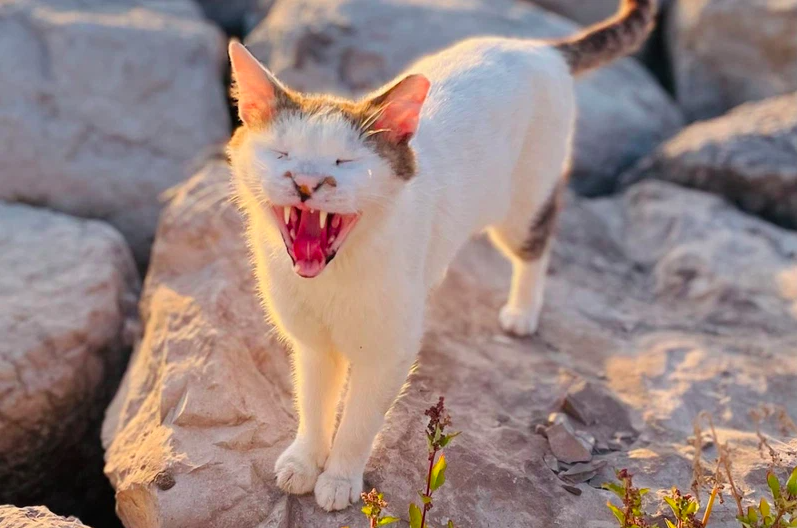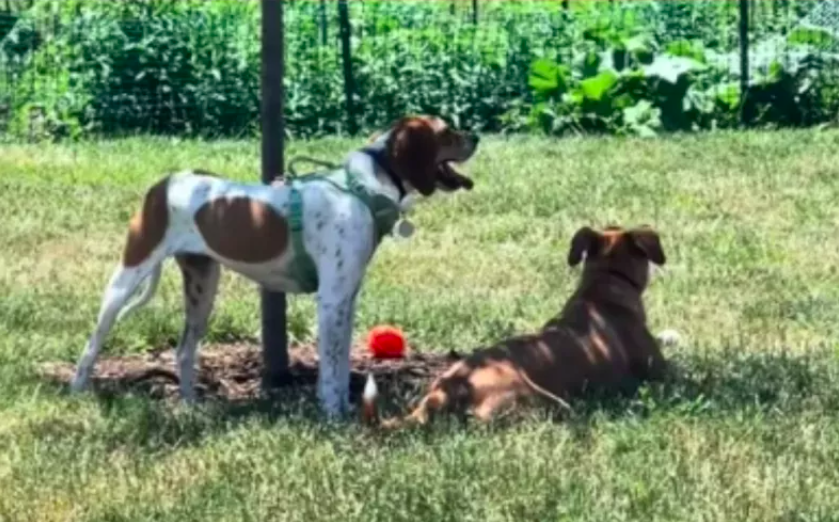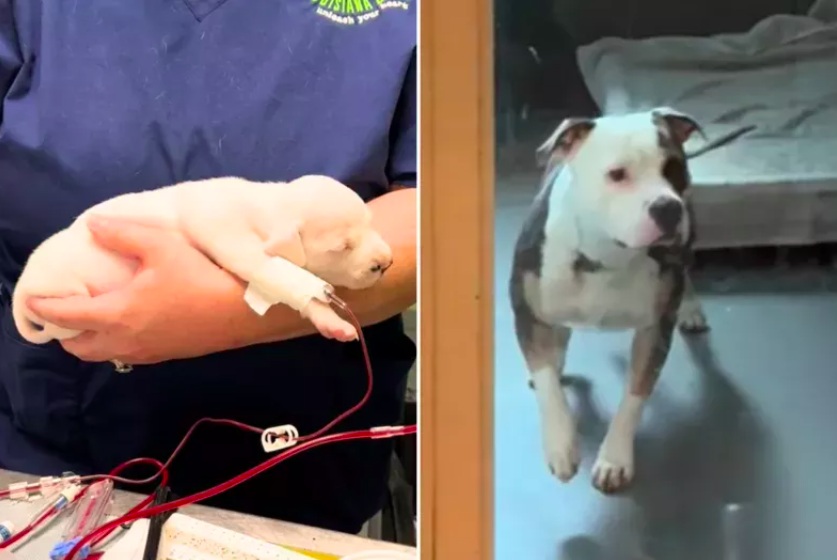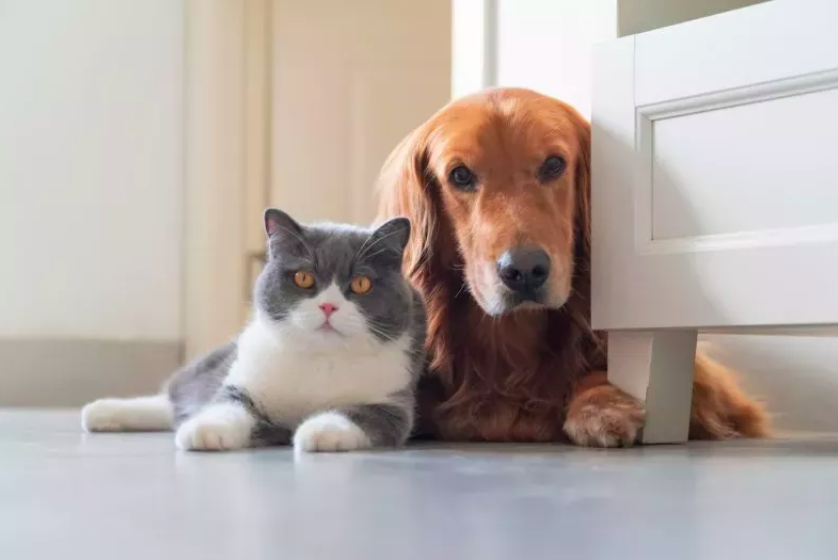Trending Pet Stories
Why Is Your Cat Dry Heaving? Unraveling the Top 3 Causes

Why Is Your Cat Dry Heaving? Unraveling the Top 3 Causes
As a cat owner, there’s nothing more disconcerting than seeing your furry friend in discomfort. One such troubling situation is when your cat starts dry heaving, making those unsettling coughing or gagging sounds.
This guide will help you understand the top three reasons why your feline companion might be exhibiting this behavior.
Understanding Dry Heaving in Cats
Dry heaving in cats can sometimes be mistaken for routine hairball expulsion, but there’s more to it. It usually occurs when cats try to vomit repeatedly but are unable to bring anything up.
Common symptoms include crouching, stomach contractions, and retching sounds. While this may sometimes happen due to quick eating, other causes include hairball blockages or accidental ingestion of indigestible items.
Cats with kidney and liver conditions may also display these symptoms due to nausea.
If your cat dry heaves occasionally, there’s generally no cause for concern. But if it becomes a regular occurrence, you should seek veterinary advice immediately.
Deciphering the Three Main Causes of Cat Dry Heaving
1. Nausea: A Common Ailment in Cats
Cats frequently exhibit gastrointestinal symptoms like dry heaving, vomiting, or diarrhea when they’re unwell. A variety of factors can upset a cat’s stomach, such as ingestion of a toxic substance, viral infections, or even certain plant species.
An upset stomach can also be a result of bacterial infections or consumption of spoiled food.
2. Gastroenteritis: More Than Just a Stomach Bug
Gastroenteritis in cats refers to inflammation of the stomach and intestines. It’s often caused by parasites, viruses, bacteria, medications, or sudden dietary changes. Common symptoms include vomiting, diarrhea, loss of appetite, lethargy, and sensitivity to touch.
Dehydration is a common consequence of gastroenteritis. Rehydration through oral, subcutaneous, or intravenous methods is a typical treatment. A professional diagnosis often involves blood tests and a careful analysis of the cat’s symptoms and history.
3. Eating Too Fast: An Overlooked Issue
Cats sometimes dry heave when they eat their meals too quickly, especially if it’s their favorite dish. This rapid eating behavior could be a sign of boredom or lack of mental stimulation.
Cats that eat too quickly often end up vomiting after a few dry heaves, while others might settle down without any further issues.
In Conclusion
Understanding the causes of dry heaving in your cat is an essential step towards ensuring their well-being. Regular monitoring of your pet’s habits and quick response to unusual behaviors can go a long way in maintaining their health.
We appreciate you for taking the time to read this article!
Finally, we hope you found this article interesting? And what do you think about ”Why Is Your Cat Dry Heaving? Unraveling the Top 3 Causes!?”
Please feel free to share or inform your friends about this article and this site, thanks!
And let us know if you observe something that isn’t quite right.
Story Source: The South African
Trending Pet Stories
Heartwarming Reunion: Rescue Dog Discovers Best Friend From Shelter Lives Next Door

Heartwarming Reunion: Rescue Dog Discovers Best Friend From Shelter Lives Next Door
In a touching twist of fate, a rescue dog’s life has been filled with newfound joy upon discovering that his best friend from the shelter lives just next door. This heartwarming story highlights the incredible bond between two dogs and their reunion, which has captured the hearts of animal lovers everywhere.
The Unbreakable Bond of Shelter Friends
Before the reunion, Max and Bella were inseparable at the local animal shelter. Both dogs had been brought to the shelter under difficult circumstances, each looking for a second chance at life. They found solace and companionship in each other’s presence, forming a special bond that made their time at the shelter more bearable.
Max, a friendly and energetic Labrador mix, and Bella, a gentle and affectionate Border Collie, spent their days playing and comforting one another. Their connection was evident to everyone at the shelter, and staff hoped that both dogs would find loving homes where they could continue to be together.
The Joyful Discovery
After being adopted, Max moved to a new home, where he quickly adjusted to his new life. His new family loved him dearly, and Max seemed to be flourishing in his new environment. However, a surprising twist was about to unfold.
One day, while Max was out for a walk in his neighborhood, he caught sight of a familiar face. To his amazement, Bella, his old friend from the shelter, was living just next door. The moment Max and Bella recognized each other, their joy was palpable. The dogs excitedly reunited, their tails wagging and eyes sparkling with happiness.
A Reunion of Happiness and Relief
The reunion was nothing short of magical. Max and Bella greeted each other with enthusiastic barks, playfully bounding around in their shared backyard. The sight of their joyful reunion brought tears of happiness to their owners’ eyes.
Their families were equally thrilled to see the two friends reunited. The owners quickly arranged for regular playdates and gatherings, ensuring that Max and Bella could continue their friendship just as they had at the shelter. The bond between the dogs only grew stronger as they spent time together, enjoying each other’s company and the comfort of their shared history.
@goosegooseduckling 🥹🥹🥹What a small world! #teamwork #teamworkmakesthedreamwork #wegotthis #fyp #goalcrusher #tiktok #100kviews✔️ #smarttokviral #debtfreejourney #creatorinsights #debtfreejourney #roadto10k #roadto100k #dogsoftiktok #dogpack #dogmom #dog #cute #roadto1k #cute #aww #bestfriend #bestie
The Impact on the Dogs’ Well-being
The reunion had a profoundly positive impact on both Max and Bella. For Max, seeing his old friend brought a sense of familiarity and comfort that eased his transition into his new home. Bella, who had also been adjusting to her new environment, found joy and solace in reconnecting with her best friend.
The emotional support and companionship they provided each other helped both dogs adapt more easily to their new lives. Their playful interactions and mutual affection demonstrated the deep emotional connections that animals can form, and the importance of maintaining such bonds even after being separated.
Celebrating the Joy of Reunion
The story of Max and Bella’s reunion has resonated with many people, highlighting the profound impact that animal friendships can have on their lives. Their heartwarming story has been shared widely, inspiring others to appreciate and cherish the connections they have with their pets.
In celebration of their reunion, both families have shared their story through social media, spreading joy and positivity. They have also used their experience to advocate for animal shelters and the importance of adopting pets, encouraging others to provide loving homes for animals in need.
Conclusion
The joyful reunion of Max and Bella is a testament to the incredible bonds that can form between animals and the happiness that comes from reconnecting with a cherished friend. Their story serves as a beautiful reminder of the impact that companionship and love can have on our lives, both for animals and their human companions.
As Max and Bella continue to enjoy their time together, their story will undoubtedly inspire others to value the friendships they share with their pets and to support the vital work of animal shelters. The heartwarming reunion of these two rescue dogs is a celebration of friendship, love, and the joy of finding home.
Frequently Asked Questions (FAQs)
How did Max and Bella end up living next door to each other?
Max and Bella were adopted separately but happened to end up living next door due to a fortunate coincidence. Their families discovered the connection while Max was out for a walk.
What was the initial reaction of Max and Bella upon their reunion?
Both dogs displayed immense joy upon recognizing each other. They excitedly ran towards each other, wagging their tails and playing together in their shared backyard.
How has the reunion affected the dogs’ well-being?
The reunion has had a positive impact on both dogs, providing them with comfort and happiness. The continued companionship has helped them adapt more easily to their new environments.
How are Max and Bella’s families supporting their friendship?
The families have arranged regular playdates and gatherings to ensure that Max and Bella can continue spending time together, maintaining their strong bond.
What message does the story of Max and Bella convey?
The story highlights the deep emotional connections animals can form and the joy that comes from reuniting with a cherished friend. It also emphasizes the importance of adopting pets and supporting animal shelters.
We appreciate you for taking the time to read this article!
Finally, we hope you found this article interesting? And what do you think about ”Heartwarming Reunion: Rescue Dog Discovers Best Friend From Shelter Lives Next Door!?”
Please feel free to share or inform your friends about this article and this site, thanks!
And let us know if you observe something that isn’t quite right.
References: For more information, you can read the original article: Newsweek – Joy as Rescue Dog Realizes His Best Friend From His Shelter Lives Next Door.
Trending Pet Stories
Hero Shelter Dog Saves Dangerously Sick Puppy With Life-Saving Blood Transfusion

Hero Shelter Dog Saves Dangerously Sick Puppy With Life-Saving Blood Transfusion
In an incredible act of compassion and bravery, a shelter dog has stepped up to save the life of a dangerously sick puppy through a life-saving blood transfusion. This heartwarming story highlights the remarkable bond between animals and the extraordinary lengths they can go to help one another.
The Urgent Need for a Blood Transfusion
The story begins with a puppy in dire need of medical intervention. The young pup, whose name remains undisclosed for privacy reasons, was suffering from a severe illness that left it critically low on red blood cells. The condition was rapidly deteriorating, and without immediate treatment, the puppy’s chances of survival were slim.
Veterinary professionals at the local animal shelter quickly identified that a blood transfusion was the only viable option to save the puppy’s life. However, finding a suitable donor was a pressing concern, given the urgency of the situation.
Enter the Hero: A Shelter Dog with a Big Heart
Amidst the chaos and worry, a courageous shelter dog emerged as the unlikely hero. The dog, affectionately known as “Max,” had been living at the shelter for some time, waiting for a forever home. Max was known for his gentle nature and strong constitution, making him an ideal candidate for the blood donation.
Veterinarians conducted a thorough evaluation to ensure Max’s blood was a compatible match. They were pleased to find that his blood type and health were suitable for the transfusion. With Max’s consent (as much as a dog can give), preparations began for the procedure.
@laspca A puppy (Dragon Fruit) was found in a bush at an apartment complex. He was heavily coated in fleas and anemic. That’s when a hero (Scout) stepped in to save the day. He donated several bags of blood, and now the puppy safely rests in foster care until ready for adoption. Scout is also in foster care and waits for a hero to adopt him. #shelterdog #blood #anemic #puppy #puppytiktok #shelterpetsoftiktok
The Blood Transfusion Process
The transfusion process was meticulously planned and executed. Max was carefully prepared for the donation, with veterinarians ensuring he was comfortable and well-cared for. The procedure involved drawing blood from Max in a controlled and sterile environment to minimize any risk to his health.
The collected blood was then transported to the sick puppy, where it was administered through an intravenous line. The process required close monitoring to ensure that the puppy’s body accepted the transfusion without any adverse reactions.
A Miraculous Recovery
Thanks to Max’s generous donation, the sick puppy’s condition began to improve almost immediately. The transfusion provided the necessary red blood cells to combat the illness, and the puppy’s health started to stabilize. Within days, the once-ailing puppy was showing signs of recovery, gaining strength and energy.
The transformation was nothing short of miraculous. The puppy, who had been on the brink of death, was now well on its way to a full recovery, thanks to the selfless act of Max. The shelter staff, veterinarians, and volunteers celebrated this success, knowing that Max’s bravery had made all the difference.
The Bond Between the Dogs and the Shelter Community
Max’s story has touched the hearts of many and has brought attention to the remarkable bond that can exist between animals. The shelter community, along with animal lovers worldwide, has been inspired by Max’s heroism and the puppy’s recovery.
Max, once a shelter dog waiting for a home, has become a symbol of hope and courage. His act of kindness has not only saved a life but also highlighted the incredible potential for animals to support and care for one another in times of need.
Future of the Heroic Dog and the Puppy
As for Max, his heroic act has not gone unnoticed. The shelter has received numerous inquiries from potential adopters eager to provide Max with the loving home he deserves. The hope is that Max will soon find a forever family that will cherish him as much as the community has.
The puppy, on the other hand, continues to thrive under the care of the shelter. With its health restored, it is expected to find a loving home in the near future, where it will grow up healthy and strong.
Conclusion
The story of Max and the sick puppy serves as a powerful reminder of the remarkable capacity for compassion and heroism within the animal kingdom. Max’s selfless act of donating blood has not only saved a life but has also demonstrated the extraordinary bond that can exist between animals and the impact they can have on each other’s lives.
This heartwarming tale of bravery and recovery continues to inspire and uplift those who hear it, showcasing the incredible power of kindness and the potential for animals to be heroes in their own right.
Frequently Asked Questions (FAQs)
What led to the need for a blood transfusion for the puppy?
The puppy was suffering from a severe illness that caused a critical drop in red blood cells, necessitating an urgent blood transfusion to save its life.
How was Max selected as the donor dog?
Max was chosen based on his health and compatibility. Veterinarians ensured his blood type and overall condition were suitable for the transfusion.
What is the process for a dog donating blood
The process involves drawing blood from the donor dog in a controlled environment. The blood is then carefully administered to the recipient dog, with close monitoring to avoid any adverse reactions.
How did the puppy respond to the blood transfusion?
The puppy showed significant improvement almost immediately after the transfusion, with its condition stabilizing and health recovering rapidly.
What will happen to Max and the puppy now?
Max is being considered for adoption, with many interested in providing him a forever home. The puppy, having recovered, will also be up for adoption soon.
We appreciate you for taking the time to read this article!
Finally, we hope you found this article interesting? And what do you think about ”Hero Shelter Dog Saves Dangerously Sick Puppy With Life-Saving Blood Transfusion!?”
Please feel free to share or inform your friends about this article and this site, thanks!
And let us know if you observe something that isn’t quite right.
References: For more information, you can read the original article: Newsweek – Dangerously Sick Puppy Receives Blood Transfusion From ‘Hero Shelter Dog’.
Trending Pet Stories
Woman Realizes Her Pets See Her as a Valued Companion, Not a ‘Spare Human’

Heartfelt Moment: Woman Realizes Her Pets See Her as a Valued Companion, Not a ‘Spare Human’
In an emotionally resonant moment that has touched hearts across the internet, a woman’s realization that she is not merely a secondary figure in her pets’ lives has captivated many. This story underscores the profound bond between humans and their animal companions, revealing how pets can make their owners feel deeply valued and loved.
The Story Behind the Realization
A Typical Day with Pets
The woman, who has chosen to remain anonymous, shared her experience of a typical day with her two beloved pets—a dog and a cat. While she often felt that her pets were more focused on each other and less on her, a series of events led her to a heartwarming realization about her place in their lives.
The Triggering Incident
The pivotal moment occurred when she returned home after a particularly stressful day. Expecting her pets to be preoccupied with each other, she was surprised to find both animals eagerly waiting at the door, their excitement palpable. Her dog, a Golden Retriever named Max, and her cat, Luna, were unusually affectionate, showering her with attention and comfort.
The Emotional Revelation
As the day unfolded, the woman observed that Max and Luna were not just responding to her presence but actively seeking ways to comfort and engage with her. Max would nuzzle her gently, while Luna curled up on her lap, purring contentedly. It was in this simple, loving interaction that she realized her pets did not see her as an afterthought but as a central, cherished part of their lives.
The Significance of the Bond
Understanding Pet Affection
Pets have a unique way of expressing their affection, often through behaviors that might seem subtle or understated. For many pet owners, understanding these signals can lead to profound insights into their pets’ emotional states and their own significance in their lives.
The Impact of the Realization
The woman’s realization highlights a common yet often overlooked aspect of pet ownership: the deep, mutual love that exists between pets and their owners. This epiphany not only strengthened her bond with Max and Luna but also deepened her appreciation for the unique ways in which animals express their love.
Emotional and Psychological Benefits
The Joy of Mutual Affection
Experiencing a deep emotional connection with pets can provide significant psychological benefits. Studies have shown that pets can reduce stress, anxiety, and feelings of loneliness, contributing to overall mental well-being. The woman’s realization that she is an important part of her pets’ lives reinforces the emotional support and joy that pets can offer.
Strengthening the Human-Animal Bond
Understanding that pets view their owners as central to their happiness can strengthen the human-animal bond. This realization encourages pet owners to engage more deeply with their pets, fostering a more fulfilling and supportive relationship.
@kayaandbernie Personal bodyguards 🐾❤️ #petsoftiktok #love #catsoftiktok #fyp #fypシ゚viral
Caring for Your Pets: Beyond the Basics
Recognizing and Responding to Pet Affection
To nurture a strong bond with pets, it’s essential to recognize and respond to their expressions of affection. This includes paying attention to their behaviors, such as seeking proximity, engaging in play, and responding to affectionate gestures.
Building a Stronger Connection
Building a stronger connection with pets involves regular interaction, positive reinforcement, and creating a supportive environment. Engaging in activities that both pets and owners enjoy can enhance the relationship and contribute to mutual happiness.
The Broader Implications
Encouraging Pet Adoption
Stories like the woman’s realization can inspire others to adopt pets and experience the profound emotional benefits that come with a strong human-animal bond. Understanding the depth of affection that pets can offer encourages responsible pet ownership and adoption.
Highlighting the Importance of Pet Care
This story also emphasizes the importance of attentive and compassionate pet care. Recognizing the significant role pets play in their owners’ lives reinforces the need for responsible and loving care.
Conclusion
The heartwarming realization that a woman is not merely the ‘spare human’ in her pets’ lives serves as a beautiful reminder of the deep bonds that exist between humans and their animal companions. This story highlights the mutual affection and emotional support that pets and their owners share, enriching both their lives in profound ways. By recognizing and cherishing these connections, pet owners can foster a loving and supportive environment that benefits both themselves and their beloved pets.
Frequently Asked Questions (FAQs)
How can I tell if my pet sees me as more than just a caretaker?
Pets often show their affection through behaviors such as seeking physical closeness, showing excitement when you return home, and engaging in playful or comforting interactions. Observing these behaviors can provide insights into how your pet values your presence.
What are some ways to strengthen the bond with my pet?
Strengthening the bond with your pet can involve spending quality time together, engaging in activities that both you and your pet enjoy, and providing positive reinforcement. Regular, affectionate interactions help build a stronger connection.
How do pets typically show their affection towards their owners?
Pets show affection through various behaviors, including following their owners around, seeking physical contact, displaying excitement when the owner returns home, and offering gentle touches or purring. These actions reflect their emotional attachment.
Can understanding my pet’s behavior improve our relationship?
Yes, understanding your pet’s behavior can improve your relationship by fostering better communication and interaction. Recognizing and responding to your pet’s needs and expressions of affection can strengthen the bond between you.
What are the psychological benefits of having a strong bond with a pet?
A strong bond with a pet can reduce stress, anxiety, and feelings of loneliness. Pets provide emotional support and companionship, contributing to overall mental well-being and enhancing quality of life.
We appreciate you for taking the time to read this article!
Finally, we hope you found this article interesting? And what do you think about ”Woman Realizes Her Pets See Her as a Valued Companion, Not a ‘Spare Human’!?”
Please feel free to share or inform your friends about this article and this site, thanks!
And let us know if you observe something that isn’t quite right.
References: Newsweek Article
-

 Pet Care2 years ago
Pet Care2 years agoThe Best Dog Collars For 2022
-

 Dogs2 years ago
Dogs2 years agoBichon Frise: The Happy, Playful, and Cuddly Companion
-

 Trending Pet Stories1 year ago
Trending Pet Stories1 year ago2023 ‘World’s Ugliest Dog’ Winner: Scooter’s Tale of Resilience
-

 Animals2 years ago
Animals2 years agoAre There Animals Having Down Syndrome?
-

 Pets2 years ago
Pets2 years agoThe Fascinating World Of The Red Chameleon
-

 Dogs2 years ago
Dogs2 years agoTop 10 Most Popular Dog Breeds According To AKC.
-

 Dogs2 years ago
Dogs2 years ago21 Dog Breeds That Resemble Bears Or Teddy Bears!
-

 Dogs2 years ago
Dogs2 years agoEskimo Dogs from Canada – What Are They? – Find Out!







